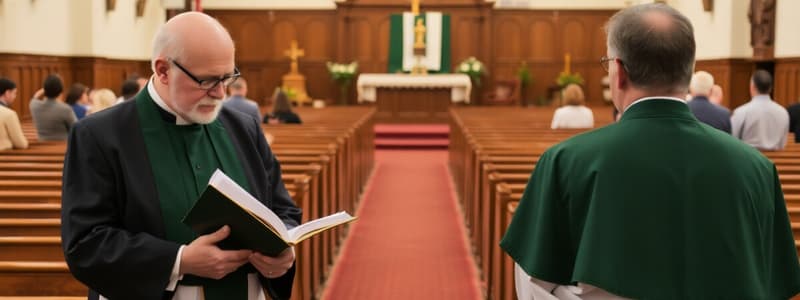Podcast
Questions and Answers
What are the primary responsibilities of a verger in a church?
What are the primary responsibilities of a verger in a church?
The primary responsibilities include maintaining the church's physical structure, managing resources, assisting with services, and welcoming visitors.
How has the role of the verger evolved over the centuries?
How has the role of the verger evolved over the centuries?
The role has evolved from informal caretakers of churches to highly organized individuals with defined responsibilities in modern settings.
In what ways can modern vergers impact the execution of church events?
In what ways can modern vergers impact the execution of church events?
Modern vergers can plan and execute events, manage logistics, and ensure the smooth flow of services, thereby enhancing the overall church experience.
Describe the training requirements for a verger.
Describe the training requirements for a verger.
What is the relationship between vergers and clergy in a church?
What is the relationship between vergers and clergy in a church?
What historical roles, aside from management, did early vergers perform?
What historical roles, aside from management, did early vergers perform?
Why might experience in facility management be beneficial for a verger?
Why might experience in facility management be beneficial for a verger?
How do the duties of vergers differ across various religious institutions?
How do the duties of vergers differ across various religious institutions?
Flashcards
Verger's role
Verger's role
The verger is a person in charge of a church's upkeep and management.
Verger's duties
Verger's duties
Verger tasks vary but often include building maintenance, resource management, and service support.
Historical Vergers
Historical Vergers
Early vergers likely had broad responsibilities, varying by time and place.
Modern Vergers
Modern Vergers
Signup and view all the flashcards
Verger training
Verger training
Signup and view all the flashcards
Verger-Clergy relationship
Verger-Clergy relationship
Signup and view all the flashcards
Verger responsibilities
Verger responsibilities
Signup and view all the flashcards
Verger's skills
Verger's skills
Signup and view all the flashcards
Study Notes
Roles and Responsibilities
- A verger is a person responsible for the upkeep and management of a church or chapel.
- Duties include a variety of tasks, often including:
- Maintaining the physical structure of the building, including cleaning, repairing, and general upkeep.
- Managing the church's resources, like the grounds and supplies.
- Assisting with services, such as arranging seating and handling communion elements.
- Welcoming visitors and providing directions.
- Responsibilities can vary significantly depending on the size and type of religious institution.
- Some vergers may also have custodial responsibilities for religious objects.
Historical Context
- The role of the verger has existed for centuries, evolving alongside the development of religious architecture and practices.
- Early vergers were likely individuals responsible for the day-to-day care of the church, as opposed to formal, defined roles.
- The specific duties and titles associated with vergers may have differed across regions and denominations.
- Historically, the verger could also perform other tasks, such as acting as a messenger or a caretaker for the community.
Modern Vergers
- In modern contexts, vergers are often highly organized and versed in their church's procedures.
- They can be involved in planning and executing events.
- Modern descriptions of the verger's capacity often emphasize the role in maintaining the smooth flow of services and functions within the church community.
- The level of responsibility can be substantial, ranging from basic tasks to management of significant events.
- Vergers generally work with clergy, helping to ensure the safety and comfort of churchgoers.
Training
- Training for vergers varies.
- Some churches may provide basic training on the procedures and expectations.
- Some vergers may transition into the role with prior experience.
- Experience in related fields, like facility management or customer service, can be advantageous.
- Training might be tailored to the particular needs of each individual church.
Relationship with Clergy
- Vergers often work closely with clergy, cooperating to ensure the smooth functioning of the church.
- They may be involved in various processes, from preparing for services to attending to member requests.
- They help manage the logistical aspects of church events and gatherings.
- Clergy may rely on vergers for vital support, making them an integral part of the church staff.
Community Relations
- Vergers can serve as a valuable link between the church and the larger community.
- They often greet visitors, answer questions, and provide information about the church and its activities.
- They may be a direct point of contact for inquiries, helping to engage with the community.
- Their interactions can promote a welcoming atmosphere, nurturing the church's community relations.
Studying That Suits You
Use AI to generate personalized quizzes and flashcards to suit your learning preferences.



